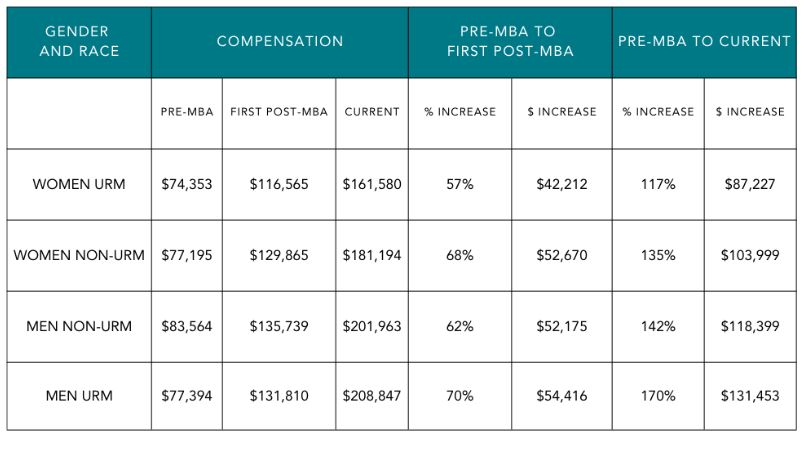
While earning an MBA can significantly increase the pay of women and minorities immediately after earning the degree, it does not eliminate the gender pay and promotion gap, particularly for underrepresented minority women, according to a new study conducted by Forté Foundation.
The research – led by Michelle Wieser, Ph.D., Dean of the School of Business and Technology at Saint Mary’s University of Minnesota – found that an MBA can boost pay of women and minorities by 57% or more in their first post-degree job, but non-minority men experience a boost of 62%.
“The gender pay gap has narrowed since 2016 and 2018 but has not budged during the pandemic despite calls for pay equity and transparency,” says Forté CEO Elissa Sangster in a release.
“Women need to take on leadership roles with profit and loss responsibility to get on the CEO track. When they do, they earn more, but still less than their male peers. They also face greater barriers to leadership including lack of a formal career plan, sponsorship, and female role models – all things that can be addressed by company leadership, managers, and women – ideally working together.”
The study examined the pay and promotion gaps, leadership barriers, and work-life issues faced by MBA graduates. Researchers surveyed 1,476 MBA alumni between October 18 and November 21, 2022 at over 60 elite MBA programs, including its member schools in the U.S., Europe, and Canada. Forté Foundation is a nonprofit organization focused on women’s advancement through access to business education.
Forte found that despite an increase in women’s enrollment in MBA programs, the gender pay and promotion gap remains a challenge.
COMPENSATION BY GENDER AND RACE

Elissa Sangster, CEO of the Forte Foundation
According to the study, both women and men, including underrepresented minorities, experience a substantial increase in salary in their first post-MBA job. However, pay gaps by gender and race emerge and widen over time.
Meanwhile, although the overall gender pay gap for “current compensation” has narrowed from 2016 to 2022, it still persists, especially for underrepresented minority women.
Before getting an MBA, compensation was more closely aligned across gender and race, though men still earn on average about 8% more ($6,864) than women – $83,524 for men compared to $76,660 for women.
Minority women earned the least of all groups at $74,353 on average compared to $77,195 for non minority women, $77,394 for minority men, and $83,564 for non minority men. (Underrepresented minorities represent Black, African American, Hispanic or Latin American, Native American, or a combination of these, in Forté’s research.)
In the first jobs after an MBA, both genders see a salary surge. However, while the gender pay gap narrows to 6%, the dollar amount widens to $8,681. Minority women continue to earn the least followed by non-URM women.
- In their first post-MBA job, women’s salaries jumped 65% from an average of $50,050 to $126,710. Men’s salaries climbed 62% from $51,867 to $135,391.
- Minority women had a salary gain of 57% on average ($42,212), but earned the least ($116,565).
- Non minority women had a 68% pay jump from $52,670, to $129,865.
- Though non minority men did not see the biggest pay increase at 62%, they still earned more than every other group jumping from an average of $52,175, to $135,739.
When looking at survey respondent’s current compensation, the gender pay gap widens to 17% (or $35,941). Men with MBAs earn on average $209,011 currently, compared to $173,070 for women. And, not surprisingly, the biggest gap remains between minority women who earn $161,580 on average and non-minority men who earn $208,847 – a gap of 23% ($47,267).
You can see more detail in the tables below.

Source: Forte Foundation

Source: Forte Foundation
PROGRESS IN GENDER PAY GAP STALLS
Since 2016, the difference in pay by gender has made respectable strides. In 2016, Forte measured the gap to be 28% which fell to 22% in 2018 and to 17% in 2020. But progress stalled in this survey, hitting 17% again.
That means, according to Forte research, the pay gap did not budge during the pandemic.
There are likely many factors contributing to a stubborn pay gap, according to Fort findings.
Men are more likely than women to hold “line” roles (which come with profit-and-loss responsibility and higher pay) than women at a pace of 47% to 42%. This is consistent with a recent article in MIT Sloan Management Review that found women are often stuck in support roles.
- The mean compensation for a line role was $207,005 and for a staff role was $180,727. This is a difference of $26,278 (or 14%).
- And, even when women hold line roles, they earn less than men. Women earn on average $33,864 (or 17%) less than men in line roles – $184,105 for women compared to $217,969 for men.
Women face barriers to advancement, including a lack of sponsorship, confidence, and female role models. They are also less likely to have a documented career plan and receive regular coaching and mentoring.
- Women MBAs are less likely to be promoted, averaging 1.8 promotions post MBA compared to men who average 2.2 promotions. Minority women have averaged 1.5 promotions.
- More women (41%) than men (34%) are looking at the mid-management levels of Manager through Director. More men (35%) than women (30%) aspire to partner, C-level executive, president/CEO, and owner.
- Women have on average 1.1 fewer direct reports than men do.
- Women were much more likely to cite a “lack of female leaders/role models” (women 37%, men 6%) and a “lack of confidence” (women 39%, men 28%).
- More women also pointed to leadership barriers such as “a lack of formal or informal sponsorship in the organization” (women 34%, men 27%) and their own “hesitancy to share their ambition with leaders” (women 17%, men 11%).
The study’s findings highlight the need for continued efforts to address the gender pay and promotion gap, provide equal opportunities for women and minorities in leadership roles, and create supportive work environments that foster career satisfaction and retention.
“There were some surprising findings from this research. In particular, the number of women, especially underrepresented minorities, who plan to change jobs in the next year, is likely tied to a lack of career progression, equal pay, and workplace culture,” Sangster says.
“Another eye-opener was the higher-than-expected percentage of women and underrepresented minorities who relocated to a new city during the pandemic due to the ability to work remotely. These trends, coupled with return-to-office mandates by some companies, may negatively impact their ability to retain diverse employees.”
Read the full report here.
Next Page: Infographic on the different in compensations, career progression, and leadership barriers for women, men, and underrepresented minorities.





Questions about this article? Email us or leave a comment below.